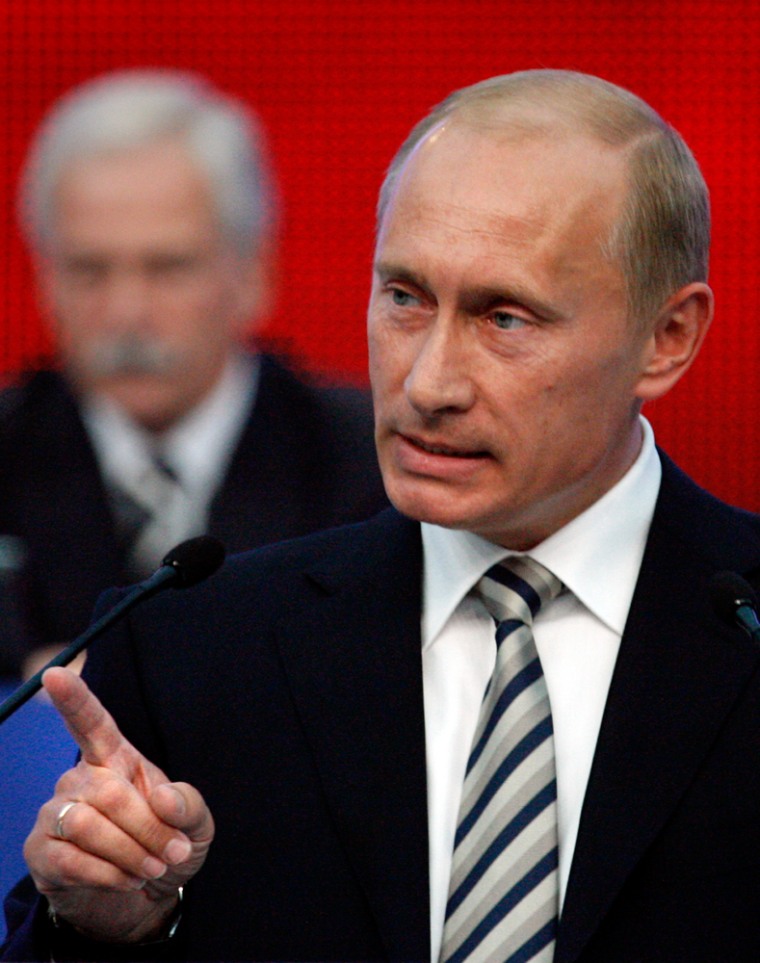President Vladimir Putin said Monday he would lead the dominant party’s ticket in December parliamentary elections and suggested he could become prime minister, the strongest indication yet that he will seek to retain power after he steps down as president early next year.
Putin is barred from seeking a third consecutive term in the March presidential election, but has strongly indicated he would seek to keep a hand on Russia’s reins.
He agreed to head the United Russia party’s candidate list in December, which could open the door for him to become a powerful prime minister — leading in tandem with a weakened president.
Putin called a proposal that he become prime minister “entirely realistic,” but added that it was still “too early to think about it.”
He said that first, United Russia would have to win the Dec. 2 elections and a “decent, competent, modern person” must be elected president.
Putin’s agreement to top the candidate list of United Russia sent an ecstatic cheer though the crowd at a congress of the party, which contains many top officials and dominates the parliament and politics nationwide. The move will likely ensure that United Russia retains a two-thirds majority in the State Duma, the lower house of parliament, enough to change the constitution.
The White House took note of Putin’s move and said it was ultimately a matter for the Russian people.
“We will be paying attention to the upcoming elections in Russia and urge them to conduct those elections in a manner that is free, fair and democratic,” National Security Council spokesman Gordon Johndroe said Monday.
Party ticket leaders used to attract votes
Leading the party’s ticket does not mean Putin will take a seat in parliament; prominent politicians and other figures often are given the top spots to attract votes, but stay out of the legislature after elections. The 450 seats in the Duma will be distributed proportionally among parties that receive at least 7 percent of the votes.
The popular Putin has repeatedly promised to step down at the end of his second term in May, as the constitution requires, but has suggested he would maintain significant influence. He offered some initial hints at his strategy last month when he named Viktor Zubkov — a previously obscure figure known mainly for his loyalty — as prime minister.
With no power base of his own, Zubkov would likely play his preordained part in any Putin plan. If he became president and Putin prime minister, Zubkov could be expected to cede specific powers to Putin or step down to allow him to return to the presidency. If he becomes prime minister, Putin would be first in line to replace the president if he is incapacitated.
Putin has amassed authority as president, but as he prepares to step down he has been setting up a system of check and balances that would weaken his successor by putting him at the mercy of rival centers of power. By leading the United Russia party list, Putin instantaneously creates the strongest such center, with himself as its head.
The move means that Putin’s successor “will not be a czar,” Kremlin-connected analyst Gleb Pavlovsky said on Ekho Moskvy radio. “There will be a new center of influence outside the Kremlin.”
Critics decry lack of democracy
Russia’s most vocal opposition alliance, co-led by the former world chess champion Garry Kasparov, applied Monday to participate in the December vote but said it expected to be blocked by the Kremlin.
“Our chance for registration is less than zero,” Kasparov told journalists, suggesting that a main aim of the application is to draw attention to what Putin’s critics say is a severe lack of democracy in Russia. “Once again, we’ll show that the government uses administrative and legal leverage to exclude dissidents from the election.”
Only registered political parties can participate in the election to the State Duma, the lower parliament house, and none of the dozen or so political movements that comprise Other Russia qualifies.
